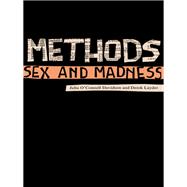- ISBN: 9780415097635 | 0415097630
- Cover: Hardcover
- Copyright: 12/1/1994
Social research yields knowledge which powerfully affects our daily lives. The 'facts' it generates shape not just how we see ourselves and others, but also whether or not we see the existing status quo as normal, just and legitimate. Everyone, particularly students of the social sciences, should therefore examine and question the methods used by social researchers to produce such knowledge. This book will help them to do so, focusing chiefly on research into human sexuality and madness, it introduces and critically assesses everything from survey methods to participant observation, opens up broader philosophical debates about the nature of knowledge, and highlights issues surrounding the ethics and politics of research.
Medical and social researchers in the nineteenth and twentieth centuries both reproduced and helped to construct a vision of 'normal' sexuality. This research provides a clear example of the links between everyday life and scientific thinking and those between social research and social power. Taking this as a starting point, the book then looks at the research community and the research process in more detail before moving on to examine the main techniques used in social research: the use of official statistics, the survey method, interviewing, laboratory observation, ethnography, the use of documentary sources and textual analysis. By exploring both technical and conceptual problems in the work of researchers like Freud and Kinsey, and by considering the difficulties faced by researchers concerned with phenomena such as rape, witch hunts and prostitution, this book makes methodological issues both interesting and accessible.
Medical and social researchers in the nineteenth and twentieth centuries both reproduced and helped to construct a vision of 'normal' sexuality. This research provides a clear example of the links between everyday life and scientific thinking and those between social research and social power. Taking this as a starting point, the book then looks at the research community and the research process in more detail before moving on to examine the main techniques used in social research: the use of official statistics, the survey method, interviewing, laboratory observation, ethnography, the use of documentary sources and textual analysis. By exploring both technical and conceptual problems in the work of researchers like Freud and Kinsey, and by considering the difficulties faced by researchers concerned with phenomena such as rape, witch hunts and prostitution, this book makes methodological issues both interesting and accessible.






